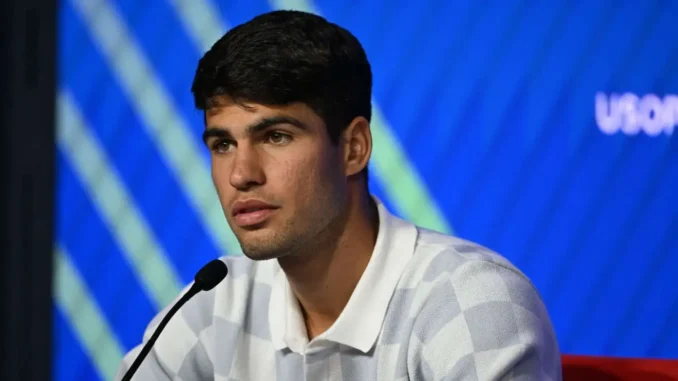
In the wake of a hard-fought victory at the Queen’s Club Championships, Carlos Alcaraz, the world No. 2 and five-time Grand Slam champion, opened up about a darker side of his meteoric rise in professional tennis: the relentless wave of abusive messages flooding his social media. The 22-year-old Spaniard, fresh off a 6-4, 7-6(4) win over Adam Walton in the first round on June 17, 2025, spoke candidly about the emotional toll of online harassment, admitting that some messages “can scare you.” His remarks, delivered during a post-match press conference, come amid growing concerns within the tennis community about the toxic underbelly of social media, particularly following high-profile revelations from players like Katie Boulter.
Alcaraz’s comments shine a spotlight on an issue plaguing athletes across the sport. The Murcia native, who clinched his second Roland Garros title just nine days earlier against Jannik Sinner in a thrilling final, described the barrage of hate he faces, especially after losses. “I receive them too. There are some really wild messages,” he said, choosing not to disclose specific content but noting their intensity. “I’m not going to mention exactly some of the messages I’ve received, but they are very heavy and some even scare you.” He explained that defeats amplify the negativity, with fans—often fueled by gambling frustrations—unleashing vitriol. “Obviously, when you lose, you receive a lot of messages. Some are quite good; others, quite bad. I prefer not to think about it,” he added, revealing a strategy of avoidance honed over time.
The Queen’s Club victory marked Alcaraz’s first grass-court outing of the 2025 season, a critical step in his Wimbledon preparations. Yet, the transition from clay to grass, one of the most challenging shifts in tennis, was overshadowed by his reflections on the mental strain of online abuse. “I learn when I lose not to check social media too much, because sometimes when I lost a match in the first round or a match I shouldn’t have lost, I saw the messages and it affected me a lot,” he admitted. Early in his career, Alcaraz would scroll through comments, only to find his confidence shaken by the negativity. Now, he advises fellow players to steer clear of social media during tough moments, warning, “As professional athletes, we have to deal with it the best way we can. If I have to give advice, it’s not to look at social media when things aren’t going very well, because people can be really dangerous sometimes.”
The issue resonates across the tennis world, with British No. 1 Katie Boulter recently exposing the “astronomical” volume of abuse she receives, including death threats and wishes for her to contract cancer. “I think it just kind of shows how vulnerable we are,” Boulter said, highlighting the fear that anonymous trolls could be nearby or know personal details. Her partner, Alex de Minaur, and British star Jack Draper have also decried the “dark side” of social media, while Harriet Dart called it a “global issue,” urging for better identification of online abusers. “We live in the 21st century, and are we not ID-ing people on social media?” Dart questioned, pointing to the lack of accountability.
Alcaraz’s openness reflects a broader push for change. The tennis community, from players like Jessica Pegula and Gael Monfils to emerging stars like Linda Noskova, has rallied to address the problem, with many sharing screenshots of vile messages. A government spokesperson labeled such abuse “appalling and deeply wrong,” noting that platforms now face legal duties to curb illegal content like death threats, with regulatory bodies empowered to impose hefty fines. Yet, the absence of mandatory identification in the UK’s Online Safety Act 2023, citing free speech and anonymity concerns, complicates solutions.
As Alcaraz prepares to face compatriot Jaume Munar in the second round at Queen’s, where he leads their head-to-head 2-1, his focus remains on reclaiming his 2023 title. Despite the online vitriol, his resilience shines through. “I’m trying to stay away from everything, be myself, and enjoy every time I step on the court,” he said, echoing a mantra that has carried him to 13 career titles, including Rotterdam, Monte-Carlo, Rome, and the French Open in 2025. With Wimbledon looming, Alcaraz’s ability to tune out the noise will be as crucial as his forehand, proving that his mental fortitude matches his on-court brilliance.
Leave a Reply